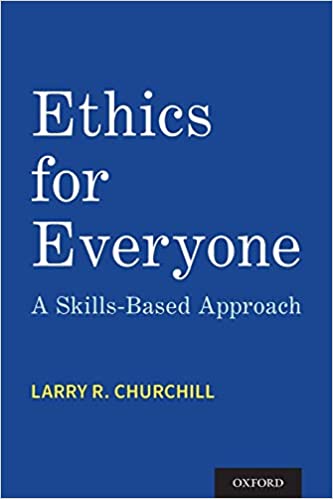Ethics for Everyone

Full Title: Ethics for Everyone:: A Skills-Based Approach
Author / Editor: Larry R. Churchill
Publisher: Oxford University Press, 2020
Review © Metapsychology Vol. 25, No. 23
Reviewer: Brian Morreale
Humanity is guided by moral principles known as ethics. Although different populations may believe different things, there are general guidelines that help dictate how individuals should behave. Ethics for Everyone, by Larry R. Churchill, helps provide a basic guide on ethics for readers with limited philosophical background. More specifically, he writes for students studying ethics in the fields of medicine, law, business, or any other field not closely associated with philosophy. Churchill, the Ann Geddes Stahlman Chair in Medical Ethics at Vanderbilt University, clearly outlines the book as well as its purpose within the introduction. This provides readers the ability to determine which chapters are more important to them and whether they should read the book straight through or jump around. More importantly, Churchill focuses on practical approaches to help the reader understand ethics as opposed to memorizing philosophical concepts. Churchill’s ability to write in layman terminology makes this book attractive to any reader wanting to begin learning about ethics.
The book does a great job introducing the reader to the topic of ethics and philosophy. Since philosophical thought is used in uncertain situations to reason and obtain a moral response, it is necessary that philosophical concepts are mentioned to explain theories and ideas within the book. However, without some knowledge of philosophy or ethics, the reader could get lost or bored trying to apply these concepts in their life. Therefore, Churchill provides exercises in the chapters to help the reader practice applying these concepts to personal experiences. The book could come off as less thrilling due to these exercises, since it is laid out in more of a textbook format. However, this is very helpful for students who have limited life experience and need more guidance applying the concepts to their lives.
A powerful component of this book is the author’s ability to clearly describe his point and cover many different ethical dilemmas that most individuals come across at least once in their life. One example includes the idea that student-athletes should or should not be paid. This ethical dilemma is discussed and approached through the lens of ethical reasoning. Although the author covers many different dilemmas through philosophical or ethical reasoning, he briefly covers a wide variety of topics and does not go into much detail. Therefore, this is ideally a book for those just starting out or not well-versed in ethics. An individual that would be interested in a more comprehensive text should move to more advanced courses or books on philosophy.
Overall, this is a wonderful book for the beginner or an older individual that wants to examine their life and/or their decisions a little closer. Although it does not go into depth the purpose of the book is to briefly introduce the reader to philosophical concepts and to help the individual understand ethics. I would highly recommend this book to those looking for a more didactic, structured form of learning how to identify and reason about various ethical dilemmas they face in their own lives.
Brian Morreale is a graduate student in the Data Analytics in Social Sciences program at the University at Buffalo. He is currently working in a Social-Personality Psychology lab researching various topics related to Metacognition.
Categories: Philosophical, Ethics
Keywords: Ethics
